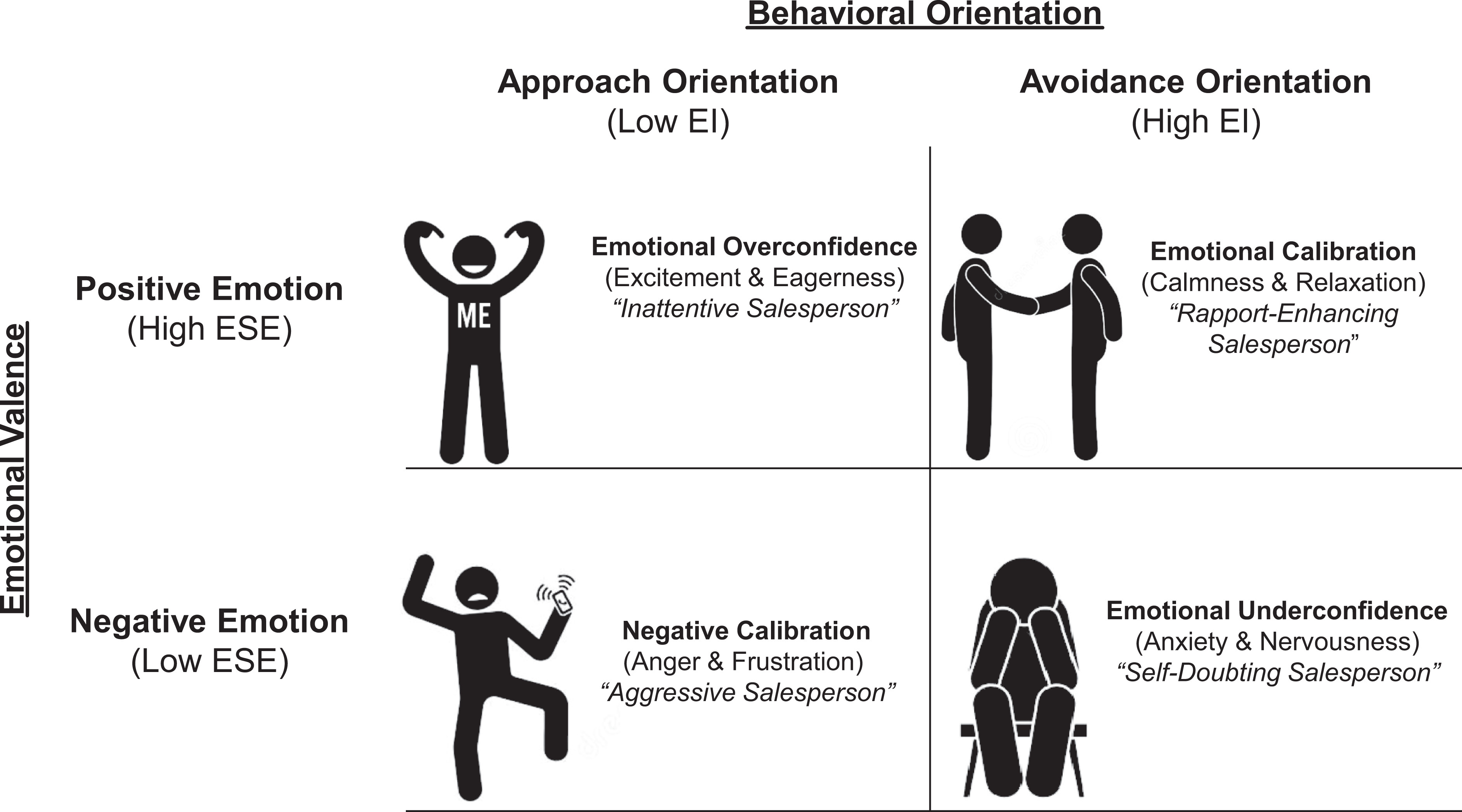Calibrating Emotions to Increase Sales
Blair Kidwell, PhD, Jonathan Hasford, PhD, Broderick Turner, PhD, David M. Hardesty, PhD, and Alex R. Zablah, PhD
Emotional competence is so important that it is considered a key performance predictor for sales recruiters. To gauge emotional competence, people have historically looked at emotional intelligence (EI), the ability to perceive, understand, and manage emotions. New research shows, however, that considering emotional self-efficacy (ESE) is just as important. Emotional self-efficacy considers a salesperson's confidence in how he or she uses emotions. Coupling high emotional self-efficacy with high emotional intelligence leads to an emotionally calibrated salesperson who is well equipped to succeed in sales interactions.
Breaking Down Emotional Calibration
Emotional calibration is the intersection of emotional intelligence (EI) and emotional self-efficacy (ESE), and it is a strong indicator of salesperson success. Understanding emotional intelligence and emotional self-efficacy independently is an important part of understanding emotional calibration as a whole; however, understanding how the two interact under varying circumstances helps to fine-tune salespeople’s effectiveness.
Emotional intelligence helps sellers interpret emotions, transfer those emotions to deeper thoughts, and then respond accordingly. Historically, emotional intelligence has been a focal point for sales recruiters. Salespeople with high levels of EI tend to have enhanced buyer-seller interactions. However, studies have found that simply having high emotional intelligence is not enough to be great at sales. Instead, it matters both how skilled one is at the ability to use, manage, facilitate, and perceive emotions and how confident they are in these abilities. EI alone is not a consistent indicator of salesperson success. Having the correct response, from high emotional intelligence, doesn’t mean that individual has the confidence to appropriately convey felt emotions, and this is where self-efficacy comes into play.
Emotional self-efficacy refers to a salesperson’s level of confidence in his or her ability to use emotions present in interactions.1,2 ESE is the doorway to effective interaction with clients. Emotionally intelligent salespeople who are also confident in their emotional skills are more likely to display positive avoidant emotions. This means they are more likely to remain calm and relaxed when interacting with customers. This interaction of emotional intelligence and emotional self-efficacy is emotional calibration, and it may be a strong determinant of sales outcomes.
Emotional Calibration in Action
We performed additional tests to examine effects of miscalibration in the four possible conditions of emotional calibration, which showed that emotionally calibrated salespeople outperformed all others.
We found that salespeople with low EI and high ESE were “emotionally overconfident.” These salespeople may be seen as inattentive to their customers, and their display of “positive approach” emotions, such as excitement and eagerness, can be off-putting to customers, thus reducing sales success.
Salespeople with low EI and low ESE, are “negatively calibrated.” They are more likely to display negative approach emotions, such as anger and frustration when dealing with their customers. These salespeople are often considered aggressive by their customers, and compared to those salespeople that are emotionally calibrated have less success.
Those with high EI and low ESE display “emotional underconfidence.” These salespeople tend to exhibit “negative avoidance emotions,” such as anxiety and nervousness in their sales interactions. The combination of having high emotional skills but low confidence in those skills may also reduce sales performance compared with those who are emotionally calibrated.
Alternatively, individuals who are “emotionally calibrated”— that is their emotional skills and confidence in those skills are both high—perform significantly better than any of the other combinations of EI and ESE. These salespeople, earn an average commission more than 270% higher than salespeople who were highly confident of their emotional skills, yet lacked these skills (i.e., the “emotionally overconfident” salespeople who scored high in ESE and low in EI).
(Figure 2 from Kidwell et al., 2021)
Equipping your Sales Force
When building personal emotional sales skills or the skills of the sales team, managers need a balanced approach that addresses both EI and ESE. Expand your focus from emotional intelligence alone and focus on emotional calibration as a goal. With a tool we developed, managers may identify a salesperson’s emotional skill level and their confidence in applying these skills to an interaction. Understanding both the skills and confidence a salesperson has can help managers in their hiring proves and can be used to develop the emotional calibration of their existing sales teams.
However, there are a few factors that can impact the effectiveness of emotional calibration. Work-related stressors and job tenure both play a role. The benefits of emotional calibration can be lessened in the presence of stress and strengthened when the longer one is at the same job. Sales managers can act accordingly by creating a supportive environment that reduces stress and one that holds onto salespeople longer. In these types of environments, salespeople who are both emotionally skilled and confident in those skills are likely to thrive.
Real Estate Implications
Real estate is the industry of relationships. It’s less about what you know and more about who you know and how you interact with them. A salesperson needs to develop both the emotional skills and abilities to deal with customers and the confidence to deploy these emotional skills and abilities. Being able confidently use, manage, facilitate, and perceive can play a big role in the outcome of the deal. Being the agent who builds rapport and communicates effectively with the clients can help you stand out among the rest.
. . . . . . . . . . . . . . . . . . .
Recommended Reading
Kidwell, Blair, Jonathan Hasford, Broderick Turner, David M. Hardesty, and Alex Ricardo Zablah (2021), “Emotional Calibration and Salesperson Performance,” Journal of Marketing, 85(6), 141-161.
. . . . . . . . . . . . . . . . . . .
References
- Dacre Pool, Lorraine and Pamela Qualter (2013), “Emotional Self Efficacy, Graduate Employability, and Career Satisfaction: Testing the Associations,” Australian Journal of Psychology, 65(4), 214-23.
- Qualter, Pamela, Lorraine Dacre Pool, Kathryn J. Gardner, Sylwia Ashley-Kot, Annabel Wise, and Aniek Wols (2015), “The Emotional Self Efficacy Scale: Adaptation and Validation for Young Adolescents,” Journal of Psychoeducational Assessment, 33(1), 33-45.
. . . . . . . . . . . . . . . . . . .
About the Authors
Blair Kidwell, PhD
Professor of Marketing and Director of the G. Brint Ryan College of Business Behavioral Lab, University of North Texas
Dr. Blair Kidwell’s (PhD – Virginia Tech) research focuses on the area of consumer decision making with an emphasis on emotion and emotional intelligence, knowledge calibration, political ideology, and gender-based choices. He has explored these and other topics in the substantive domains of food, health and financial decisions, consumer sustainability, and buyer-seller interactions. Dr. Kidwell's research has appeared in the Journal of Consumer Research, the Journal of Marketing Research, the Journal of Marketing, and the Journal of Consumer Psychology, among others. He was previously a faculty member at The Ohio State University and the University of Kentucky.
Jonathan Hasford, PhD
Associate Professor, Director of the PhD Program in Marketing and Stewart Bartley Family Faculty Research Fellow, University of Tennessee, Knoxville
Dr. Jonathan Hasford’s (PhD – University of Kentucky) research is primarily focused on how emotions influence consumer decision making. Specifically, Dr. Hasford has studied how emotions transfer between unrelated persuasion messages and how training emotional intelligence can lead to healthier eating. His research has appeared in the Journal of Consumer Research, Journal of Marketing Research, Journal of Experimental Social Psychology, and the International Journal of Research in Marketing.
Broderick Turner, PhD
Assistant Professor of Marketing, Virginia Tech
Dr. Broderick Turner (PhD – Northwestern University) runs the Technology, Race, and Prejudice (T.R.A.P.) Lab (jointhetrap.com) and he is a Business in Global Society Fellow at Harvard Business School. His main research area focuses on the intersection of marketing, technology, racism, and emotion. His academic research has been published twice in the Proceedings of the National Academy of Sciences and the Journal of Marketing. He and his fellow Trappers are pushing the boundaries on understanding how race and racism underlie many consumer and managerial decisions.
David M. Hardesty, PhD
Chair, Department of Marketing and Supply Chain Professor, and University Research Professor, University of Kentucky
Dr. David Hardesty’s (PhD – University of South Carolina) research focuses on the behavioral aspects of pricing, emotional intelligence, knowledge, political ideology, and measurement. He has published in journals such as the Journal of Marketing, Journal of Marketing Research, Journal of Consumer Research, Journal of Consumer Psychology, Journal of Retailing, Journal of Business Research, Journal of Advertising, and the Journal of Public Policy & Marketing. Dr. Hardesty also serves as an associate editor for the Journal of Retailing and is on the editorial review boards for the Journal of Consumer Research and the Journal of Marketing Research. He won a Best Reviewer award for the Journal of Retailing in 2008 and 2015 and co-edited special issues focused on pricing for the Journal of Retailing in 2009 as well as the Journal of the Association for Consumer Research in 2020.
Alex R. Zablah, PhD
Department Head and Gerber/Taylor Professor of Marketing, University of Tennessee, Knoxville
Dr. Alex R. Zablah’s (PhD – Georgia State University) research seeks to improve understanding of how frontline factors (organizational processes, employees, and technologies) influence the quality of customer-firm exchanges and, ultimately, firm performance. His research has been published in leading marketing, management, and information systems journals, including the Journal of Marketing, Journal of Applied Psychology, Information Systems Research, Journal of the Academy of Marketing Science, and International Journal of Research in Marketing. He has served on the editorial review board of numerous journals, including the Journal of Marketing, Journal of the Academy of Marketing Science, and International Journal of Research in Marketing. Over the years, Alex has received several awards in recognition for his research endeavors, performance in the classroom, and service as a reviewer.

